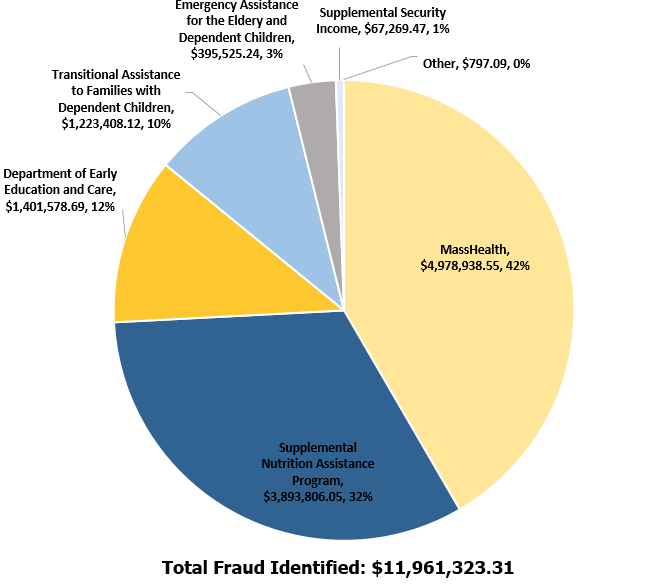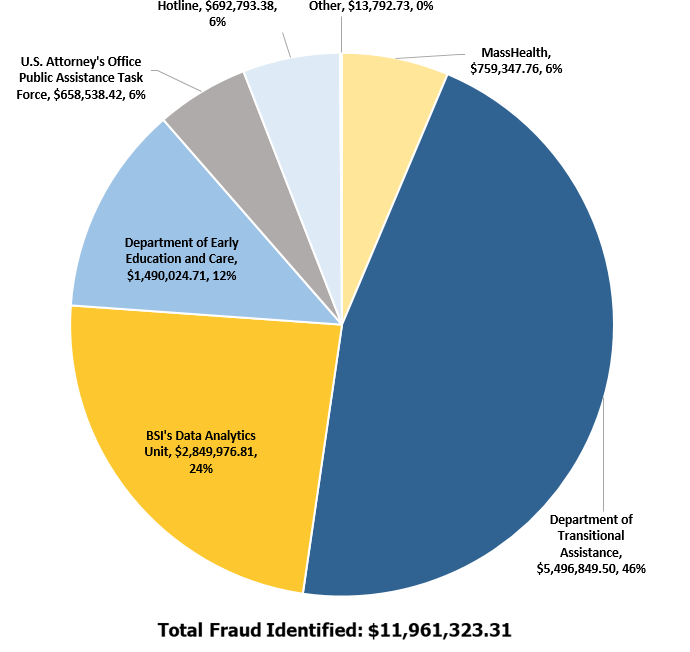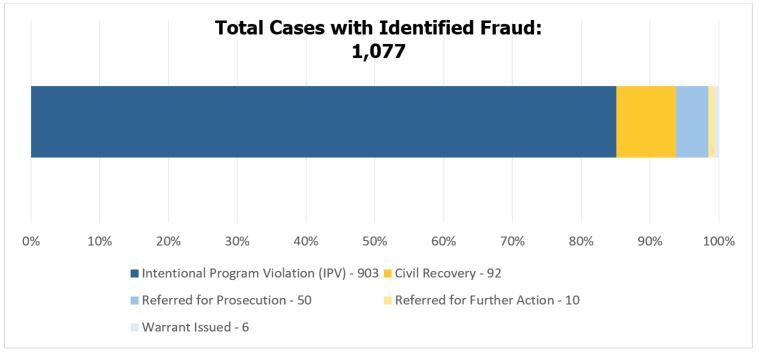Overview
Figure 6. FY19 Fraud Dollars Identified, by Public Benefit Program
BSI By the Numbers
- 2,370: BSI cases at the start of FY19
- 5,369: New investigations
- 5,787: Total completed investigations
- 1,077: Completed investigations with identified fraud
- 1,952: BSI cases at the start of FY20
Fraud Identified by Referral Source
Figure 7. Fraud Dollars Identified by Referral Source
Table 1. FY19 Caseload by Referral Source
|
Caseload |
EEC |
Data Analytics |
MassHealth |
Department of Transitional Assistance |
Hotline |
Task Force |
Other |
Total |
|
Beginning Balance |
37 |
225 |
224 |
1,702 |
148 |
28 |
6 |
2,370 |
|
New Investigations |
14 |
78 |
1,218 |
3,444 |
571 |
38 |
6 |
5,369 |
|
Total Completed Investigations |
39 |
253 |
1,176 |
3,828 |
462 |
26 |
3 |
5,787 |
|
Completed with No Fraud |
9 |
22 |
1,063 |
2,321 |
389 |
2 |
1 |
3,807 |
|
Completed with Identified Fraud |
30 |
231 |
113 |
628 |
49 |
24 |
2 |
1,077 |
|
Completed as Potential Intentional Program Violation |
0 |
0 |
0 |
879 |
24 |
0 |
0 |
903 |
Identified Fraud Cases by Disposition
Figure 8. Summary of Cases with Identified Fraud for FY19
When BSI investigations are completed, BSI fraud examiners have to make determinations regarding the final resolutions of the cases. BSI uses different disposition codes to categorize completed investigations: closed, intentional program violation (IPV), returned to Department of Transitional Assistance (DTA) as potential IPV, referred for further action, referred for prosecution, civil recovery, and warrant issued.
- Closed cases include all investigations that were completed and closed by BSI, with or without identified fraud. In some instances, cases are closed not because there was no fraud present, but because BSI cannot obtain the necessary documentation to substantiate the fraud, or because the individual was not receiving public assistance benefits during the period of allegation. Closed cases have been adjudicated completely, and BSI will not pursue any further action.
- IPVs are cases that are returned to the DTA, MassHealth, or the Department of Early Education and Care (EEC) to be handled administratively by those agencies.
- Cases returned to DTA as potential IPVs are cases that are completed by the Central Processing Unit and determined to have potential overpayments but do not merit the deployment of BSI resources.
- Cases referred for further action are completed cases with identified fraud that require management discussions to determine appropriate resolutions. BSI will either pursue civil recovery, refer the case for prosecution, or return it to the appropriate agency for its administrative process, at which time the BSI status changes to Completed and Closed.
- Civil recovery cases are resolved through an agreement in which the subject agrees to pay back part or all of the fraudulently obtained benefits to the Commonwealth. Repayment terms must follow the originating agency’s rules and regulations.
- Cases referred for prosecution are cases in which BSI files criminal complaints against the subjects or refers the cases to a District Attorney’s Office, the Attorney General’s Office, or the US Attorney’s Office.
- Warrants are issued when BSI takes out criminal complaints against subjects and the subjects fail to show up for a court hearing.
| Date published: | January 22, 2020 |
|---|


